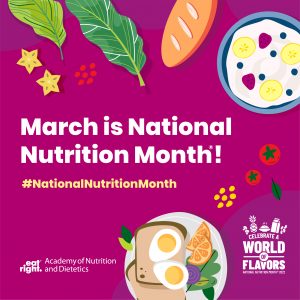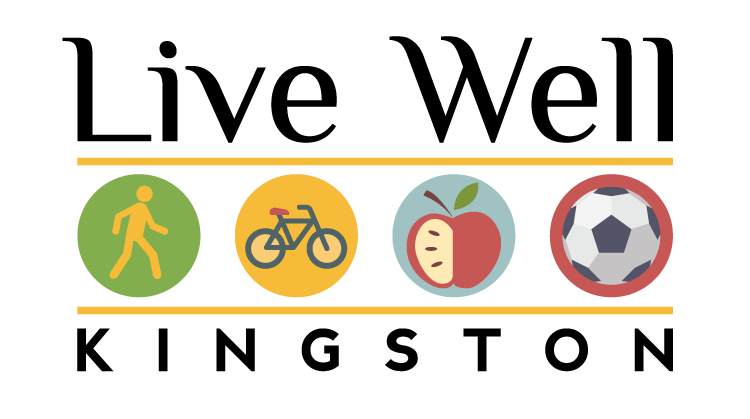
Happy National Nutrition Month®!
Each year in March we celebrate a variety of holidays, such as St. Patrick’s Day, Women’s History Month, and perhaps a lesser known month-long event, National Nutrition Month®! National Nutrition Month® is an annual campaign created by the Academy of Nutrition and Dietetics. As a part of this campaign, throughout the month of March everyone is invited to learn about making informed food choices and developing healthful eating and physical activity habits.
This year the theme for National Nutrition Month is “Celebrate a World of Flavors” to showcase how flavors from cultures around the world are a tasty way to nourish ourselves and diversity. Here at Live Well Kingston, we also like to think of this theme as a way to highlight the importance of our work being community-informed so that it is culturally relevant and appropriate. What does this mean for us? It means that when we talk about how to eat healthy, it’s not just about kale, blueberries, and whole wheat bread. It’s important to recognize that many different cultural cuisines are traditionally full of nutritious foods, which we should honor and respect.
Ready to get in the kitchen?
On social media we recently shared a few nutritious foods that, depending on your culturally background or culinary adventures, you may or may not recognize:
Chayote
- A summer squash originally from Mexico that is also known as mirliton and choko
- A great non-starchy vegetable high in fiber, folate, and vitamin C
- Prepare like any other summer squash, like zucchini or yellow squash
Seaweed
- Traditionally found in many Asian cuisines, this is a whole category of sea vegetables, with many different kinds such as kombu, nori, and dulse.
- Did you know that seaweed, which is high in fiber and iodine, is unique from vegetables grown on land in that it gets its nutrients from the water, not the soil?
- Try seaweed wrapped in your favorite sushi roll or in a salad!
Sorghum
- A naturally gluten-free whole grain that is originally from Africa, but also grown in parts of Asia.
- Naturally drought resistant, able to grow in a variety of climates including the tropics, and is efficient at fixing carbon, it’s a crop that is excellent for the environment.
- Try replacing rice with sorghum in many dishes or try it popped!
Mangosteen
- A tropical fruit full of fiber and vitamin C, with a rich, purple skin and bright white inner flesh that is originally from Southeast Asia, but now found in other tropical regions.
- This one is tricky, because it can be eaten raw, but doesn’t travel well so it can be difficult to find in the US.
Okra
- Originally native to Ethiopia, okra is now essential to many global cuisines, such as in parts of Africa and the Middle East, Caribbean, Indian, and the Southern United States, where it was brought by enslaved Africans.
- It is a non-starchy vegetable with a unique, silky or slimy texture when cooked, that is full of fiber, some protein, Vitamins K and C, and folate.
- While perhaps it is most commonly recognized as an ingredient of gumbo, it can also be used to thicken stews or even grilled.
If you’re looking for some inspiration on how to include some of these foods in your diet in a healthful way, try out this Southern Okra Bean Stew or this West African Peanut Soup, which would be delicious served over some sorghum, shared by the JSY team at Cornell Cooperative Extension!
How else does this show up in our work?
The City of Kingston was recently awarded a New York State Department of Health grant called Creating Healthy Schools and Communities. Creating Healthy Schools and Communities (CHSC) is a 5-year (2021-2026) project that supports policy, system, and environmental changes to help make the healthy choice, the easy choice in the City of Kingston. One way that CHSC does this is by working with community and work sites that have food venues to help them establish food/nutrition guidelines that are both evidence-based as well as community-informed to reflect their values and priorities, which will be unique for each site that CHSC works with!
If you run or work at a community or work site that has a food venue, such as a vending machine, café, or even a food pantry, and you’re interested in receiving support to help establish and implement food/nutrition guidelines, please don’t hesitate to reach out!
Kristin Kessler, RDN, CDN, CYT
Project Manager, Dept. Health & Wellness
Email: kkessler@kingston-ny.gov
Phone: 845-334-3917


